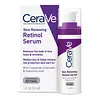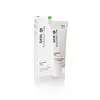What's inside
What's inside
 Key Ingredients
Key Ingredients

No key ingredients
 Benefits
Benefits

 Concerns
Concerns

 Ingredients Side-by-side
Ingredients Side-by-side

Water
Skin ConditioningGlycerin
HumectantCaprylic/Capric Triglyceride
MaskingPotassium Cetyl Phosphate
EmulsifyingHydrogenated Palm Glycerides
EmollientPolysorbate 20
EmulsifyingPEG-40 Stearate
EmulsifyingCyclopentasiloxane
EmollientHydroxyethylcellulose
Emulsion StabilisingPotassium Phosphate
BufferingCeramide NP
Skin ConditioningCeramide AP
Skin ConditioningCeramide EOP
Skin ConditioningCarbomer
Emulsion StabilisingNiacinamide
SmoothingIsoceteth-10
EmulsifyingDimethicone/Vinyl Dimethicone Crosspolymer
Skin ConditioningTriethanolamine
BufferingCetearyl Alcohol
EmollientBehentrimonium Methosulfate
Cichorium Intybus Root Extract
MaskingLecithin
EmollientRetinol
Skin ConditioningSilica
AbrasiveSodium Lauroyl Lactylate
EmulsifyingCholesterol
EmollientPhenoxyethanol
PreservativeTocopherol
AntioxidantAlcohol
AntimicrobialHydroxyacetophenone
AntioxidantCitric Acid
BufferingHydrolyzed Hyaluronic Acid
HumectantPentylene Glycol
Skin ConditioningXanthan Gum
EmulsifyingPhytosphingosine
Skin ConditioningButyrospermum Parkii Butter
Skin ConditioningEthylhexylglycerin
Skin ConditioningWater, Glycerin, Caprylic/Capric Triglyceride, Potassium Cetyl Phosphate, Hydrogenated Palm Glycerides, Polysorbate 20, PEG-40 Stearate, Cyclopentasiloxane, Hydroxyethylcellulose, Potassium Phosphate, Ceramide NP, Ceramide AP, Ceramide EOP, Carbomer, Niacinamide, Isoceteth-10, Dimethicone/Vinyl Dimethicone Crosspolymer, Triethanolamine, Cetearyl Alcohol, Behentrimonium Methosulfate, Cichorium Intybus Root Extract, Lecithin, Retinol, Silica, Sodium Lauroyl Lactylate, Cholesterol, Phenoxyethanol, Tocopherol, Alcohol, Hydroxyacetophenone, Citric Acid, Hydrolyzed Hyaluronic Acid, Pentylene Glycol, Xanthan Gum, Phytosphingosine, Butyrospermum Parkii Butter, Ethylhexylglycerin
Water
Skin ConditioningDimethicone
EmollientCentella Asiatica Extract
CleansingCaprylic/Capric Triglyceride
MaskingIsononyl Isononanoate
EmollientButyrospermum Parkii Butter
Skin ConditioningPanthenol
Skin ConditioningCholesterol
EmollientCholesteryl Isostearate
EmollientHydroxypropyl Bisstearamide Mea
Skin ConditioningCopper Chlorophyll
Cosmetic ColorantCI 77400
Cosmetic ColorantXylitol
HumectantIsohexadecane
EmollientXylitylglucoside
HumectantSodium Acrylates Copolymer
Neopentyl Glycol Dicaprate
EmollientAnhydroxylitol
HumectantBehenyl Alcohol
EmollientLecithin
EmollientTriethanolamine
BufferingButylene Glycol
HumectantParaffin
PerfumingDipropylene Glycol
HumectantCeteareth-20
Cleansing1,2-Hexanediol
Skin ConditioningPropylene Glycol
HumectantOctanediol
Tropolone
Skin ConditioningPhenoxyethanol
PreservativeWater, Dimethicone, Centella Asiatica Extract, Caprylic/Capric Triglyceride, Isononyl Isononanoate, Butyrospermum Parkii Butter, Panthenol, Cholesterol, Cholesteryl Isostearate, Hydroxypropyl Bisstearamide Mea, Copper Chlorophyll, CI 77400, Xylitol, Isohexadecane, Xylitylglucoside, Sodium Acrylates Copolymer, Neopentyl Glycol Dicaprate, Anhydroxylitol, Behenyl Alcohol, Lecithin, Triethanolamine, Butylene Glycol, Paraffin, Dipropylene Glycol, Ceteareth-20, 1,2-Hexanediol, Propylene Glycol, Octanediol, Tropolone, Phenoxyethanol
 Reviews
Reviews

Ingredients Explained
These ingredients are found in both products.
Ingredients higher up in an ingredient list are typically present in a larger amount.
This ingredient is also known as shea butter. It is an effective skin hydrator and emollient.
Emollients help soothe and soften your skin. It does this by creating a protective film on your skin. This barrier helps trap moisture and keeps your skin hydrated. Emollients may be effective at treating dry or itchy skin.
Shea butter is rich in antioxidants. Antioxidants help fight free-radicals, or molecules that may harm the body. It is also full of fatty acids including stearic acid and linoleic acid. These acids help replenish the skin and keep skin moisturized.
While Shea Butter has an SPF rating of about 3-4, it is not a sunscreen replacement.
Shea butter may not be fungal acne safe. We recommend speaking with a professional if you have any concerns.
Learn more about Butyrospermum Parkii ButterThis ingredient is an emollient, solvent, and texture enhancer. It is considered a skin-softener by helping the skin prevent moisture loss.
It helps thicken a product's formula and makes it easier to spread by dissolving clumping compounds.
Caprylic Triglyceride is made by combining glycerin with coconut oil, forming a clear liquid.
While there is an assumption Caprylic Triglyceride can clog pores due to it being derived from coconut oil, there is no research supporting this.
Learn more about Caprylic/Capric TriglycerideCholesterol is a class of organic molecules called lipids. It helps hydrate your skin and is essential to having a healthy skin barrier.
Our skin naturally contains cholesterol in the outermost layer. Besides cholesterol, it also contains ceramides and fatty acids. Cholesterol makes up about 1/4 of your skin's outer layer and barrier. Your skin barrier is responsible for keeping allergens and microbes out. Having a healthy skin barrier is also responsible for keeping your skin firm and plump.
Our bodies use cholestrol to create vitamin D, steroid hormones, and more.
Learn more about CholesterolLecithin is a term for a group of substances found in the cell membranes of plants, animals, and humans. They are made up of mixture of phospholipids.
This ingredient has emollient and emulsifying properties.
As an emollient, lecithen helps soften the skin and creates a barrier to keep moisture in.
As an emulsifier, it also helps prevent water and oil ingredients from separating. Lecithin can also help ingredients be better absorbed by the skin.
This is because the phospholipids in lecithin produce liposomes. Liposomes help other ingredients get through the skin barrier.
Depending on the source of this ingredient, lecithin may not be fungal acne safe. This is because some sources of lecithin come from soybean oil, which may feed the malassezia yeast that feeds fungal acne.
We recommend reaching out to the brand you are purchasing from to inquire about the source of their lecithin.
Some other names for this ingredient include soy lecithin and deoiled soy lecithin.
Learn more about LecithinPhenoxyethanol is a preservative that has germicide, antimicrobial, and aromatic properties. Studies show that phenoxyethanol can prevent microbial growth. By itself, it has a scent that is similar to that of a rose.
It's often used in formulations along with Caprylyl Glycol to preserve the shelf life of products.
Triethanolamine is an emulsifier and pH adjuster. It is created using ethylene oxide and ammonia. This gives Triethanolamine a nitrogen core and a similar scent to ammonia.
As an emulsifier, it prevents ingredients from separating and enhances texture by adding volume to a product.
PH adjusters are common in cosmetic products. The pH of a product can affect the effectiveness of other ingredients. A product with a high pH may also irritate the skin.
Learn more about TriethanolamineWater. It's the most common cosmetic ingredient of all. You'll usually see it at the top of ingredient lists, meaning that it makes up the largest part of the product.
So why is it so popular? Water most often acts as a solvent - this means that it helps dissolve other ingredients into the formulation.
You'll also recognize water as that liquid we all need to stay alive. If you see this, drink a glass of water. Stay hydrated!
Learn more about Water